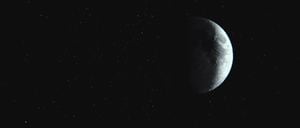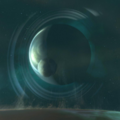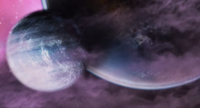Natural satellite: Difference between revisions
From Halopedia, the Halo wiki
m (→Notable moons) |
|||
| (10 intermediate revisions by 8 users not shown) | |||
| Line 1: | Line 1: | ||
{{ | {{Status|Canon}} | ||
{{Wikipedia}} | {{Wikipedia}} | ||
{{Center|''Looking for [[Earth]]'s moon, [[Luna]], or [[Moons (game)|moons]], the pool variant?''}} | {{Center|''Looking for [[Earth]]'s moon, [[Luna]], or [[Moons (game)|moons]], the pool variant?''}} | ||
[[File:H2A - Luna.jpg|thumb | [[File:H2A - Luna.jpg|thumb|300px|Luna, Earth's only natural satellite.]] | ||
A '''natural satellite''', | A '''natural satellite''', referred to as a '''satellite'''{{Ref/Site|D=01|M=6|Y=2020|URL=https://www.halowaypoint.com/en-us/universe/locations/earth|Site=Halo Waypoint|Page=Universe - Earth}}{{Ref/Site|D=01|M=6|Y=2020|URL=https://www.halowaypoint.com/en-us/universe/locations/alluvion|Site=Halo Waypoint|Page=Universe - Alluvion}}{{Ref/Site|D=01|M=6|Y=2020|URL=https://www.halowaypoint.com/en-us/universe/locations/mars|Site=Halo Waypoint|Page=Universe - Mars}} or '''moon''',{{Ref/Site|Id=meridian|D=01|M=6|Y=2020|URL=https://www.halowaypoint.com/en-us/universe/locations/meridian|Site=Halo Waypoint|Page=Universe - Meridian}}{{Ref/Site|Id=threshold|D=01|M=6|Y=2020|URL=https://www.halowaypoint.com/en-us/universe/locations/threshold|Site=Halo Waypoint|Page=Universe - Threshold}} is a celestial body that orbits a [[planet]] or smaller body, which is referred to as a "gravity anchor".{{Ref/Reuse|meridian}} Moons vary widely in size, surface features, or atmosphere. | ||
==Overview== | |||
{{ | Some natural satellites were only [[asteroid]]s captured by a planet's orbit, such as [[Reach]]'s smaller moon [[Turul]].{{Ref/Site|Id=moonsinfo|D=01|M=6|Y=2020|URL=http://carnage.bungie.org/haloforum/halo.forum.pl?read=1045222|Site=halo.bungie.org|Page=I've got your answer, Levi...}} Other moons are the size of planets, such as [[Basis]] which is nearly twice the size of [[Earth]].{{Ref/Site|D=01|M=6|Y=2020|URL=http://nikon.bungie.org/misc/sloftus_planetscale|Site=halo.bungie.org|Page=Halo-verse Planetary Scale}} | ||
== | |||
There are a number of planets that have extensive systems of moons, like [[Threshold]] and its 12 satellites,{{Ref/Reuse|threshold}} or [[Vitalyevna]] and its 27 moons.{{Ref/Site|D=01|M=6|Y=2020|URL=https://www.halowaypoint.com/en-us/universe/locations?page=2|Site=Halo Waypoint|Page=Universe - Locations - Page 2}} | |||
==List of known moons== | |||
{{Main|Category:Moons}} | |||
{{col-begin}} | {{col-begin}} | ||
{{col- | {{col-3}} | ||
*[[Reach]] | *[[Epsilon Eridani system]] | ||
**[[Turul]] | **[[Tribute]] | ||
**[[Csodaszarvas]] | ***[[Emese]] | ||
*[[ | **[[Reach]] | ||
**[[ | ***[[Turul]] | ||
***[[Csodaszarvas]] | |||
*[[Sol system]] | |||
**[[Earth]] | |||
***[[Luna]] | |||
**[[Jupiter]] | |||
***[[Jovian Moons]] | |||
****[[Io]] | |||
****[[Europa]] | |||
****[[Ganymede]] | |||
****[[Callisto]] | |||
**[[Mars]] | |||
***[[Phobos]] | |||
**[[Saturn]] | |||
***[[Titan]] | |||
*[[51 Pegasi B]] | *[[51 Pegasi B]] | ||
**[[Pegasi Delta]] | **[[Pegasi Delta]] | ||
*[[Alluvion]] | |||
**[[Fallow]] | |||
*[[Atlas]] | |||
**[[Atlas Moons]] | |||
{{col-3}} | |||
*[[Balaho]] | *[[Balaho]] | ||
**[[Buwan]] | **[[Buwan]] | ||
**[[Padpad]] | |||
*[[Bliss]] | |||
**[[Aires]] | |||
*[[Biko]] | |||
**[[Seoba]] | |||
*[[Chu'ot]] | *[[Chu'ot]] | ||
**[[Eayn]] | **[[Eayn]] | ||
*[[Doisac]] | *[[Doisac]] | ||
**[[Soirapt]] {{C|destroyed in [[2559]]}} | |||
**[[Teash]] | **[[Teash]] | ||
**[[Warial]] | **[[Warial]] | ||
*[[Dokra-Movi]] | |||
**[[Feldokra]] | |||
*[[Draetheus V]] | *[[Draetheus V]] | ||
**[[X50]] | **[[X50]] {{C|an [[Orbital reformer]]}} | ||
*[[Eiro]] | |||
*[[Gao]] | |||
*[[ | **[[Cenobia]] | ||
**[[ | |||
*[[Hesiod]] | *[[Hesiod]] | ||
**[[Metisette]] | **[[Metisette]] | ||
*[[Hestia V]] | |||
*[[ | **[[Meridian]] | ||
**[[ | *[[Onyx]] | ||
**[[XF-063 IV-1]] | |||
**[[ | |||
*[[Sanghelios]] | *[[Sanghelios]] | ||
**[[Suban]] | **[[Suban]] | ||
**[[Qikost]] | **[[Qikost]] | ||
*[[ | {{Col-3}} | ||
**[[ | *[[Threshold]] | ||
**[[Basis]] | |||
*[[Unidentified moon|Unidentified moon]] | *[[Unidentified moon|Unidentified moon]] | ||
*[[Unidentified moon (Headhunters)|Unidentified moon]] | *[[Unidentified moon (Headhunters)|Unidentified moon]] | ||
| Line 59: | Line 85: | ||
<gallery> | <gallery> | ||
File:HaloReach - ReachMoons.png|[[Csodaszarvas]] and [[Turul]], the two natural satellites of [[Reach]]. | File:HaloReach - ReachMoons.png|[[Csodaszarvas]] and [[Turul]], the two natural satellites of [[Reach]]. | ||
File:Headhunters - Moon.png|An [[Unidentified moon (Headhunters)|unidentified moon]]. | File:Headhunters - Moon.png|An [[Unidentified moon (Headhunters)|unidentified moon]]. | ||
File:Escalation - Alluvion.png|[[Alluvion]] with [[Fallow]] in the background | File:Escalation - Alluvion.png|[[Alluvion]] with [[Fallow]] in the background | ||
| Line 65: | Line 90: | ||
==Sources== | ==Sources== | ||
{{Ref/Sources}} | |||
[[Category:Moons| ]] | [[Category:Moons| ]] | ||
[[Category:Astronomical objects]] | [[Category:Astronomical objects]] | ||
Latest revision as of 14:17, August 16, 2023
| There is more information available on this subject at Natural satellite on the English Wikipedia. |
A natural satellite, referred to as a satellite[1][2][3] or moon,[4][5] is a celestial body that orbits a planet or smaller body, which is referred to as a "gravity anchor".[4] Moons vary widely in size, surface features, or atmosphere.
Overview[edit]
Some natural satellites were only asteroids captured by a planet's orbit, such as Reach's smaller moon Turul.[6] Other moons are the size of planets, such as Basis which is nearly twice the size of Earth.[7]
There are a number of planets that have extensive systems of moons, like Threshold and its 12 satellites,[5] or Vitalyevna and its 27 moons.[8]
List of known moons[edit]
- Main article: Category:Moons
Gallery[edit]

|
Browse more images in this article's gallery page. |
Csodaszarvas and Turul, the two natural satellites of Reach.
Sources[edit]
- ^ Halo Waypoint, Universe - Earth (Retrieved on Jun 1, 2020) [archive]
- ^ Halo Waypoint, Universe - Alluvion (Retrieved on Jun 1, 2020) [archive]
- ^ Halo Waypoint, Universe - Mars (Retrieved on Jun 1, 2020) [archive]
- ^ a b Halo Waypoint, Universe - Meridian (Retrieved on Jun 1, 2020) [archive]
- ^ a b Halo Waypoint, Universe - Threshold (Retrieved on Jun 1, 2020) [archive]
- ^ halo.bungie.org, I've got your answer, Levi... (Retrieved on Jun 1, 2020) [archive]
- ^ halo.bungie.org, Halo-verse Planetary Scale (Retrieved on Jun 1, 2020) [archive]
- ^ Halo Waypoint, Universe - Locations - Page 2 (Retrieved on Jun 1, 2020) [archive]



